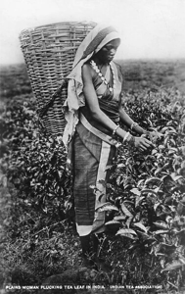We’re delighted to announce that Dr Aparajita Mukhopadhyay, lecturer in 19th-century imperial history, has been awarded a prestigious Early Career Fellowship in Cultural and Heritage Institutions by the Arts and Humanities Research Council (AHRC). This award will fund an exciting new research project that Dr Mukhopadhyay has developed with Royal Botanic Gardens, Kew (https://www.kew.org/ ). Over the next four years this projct will explore the impact of economic botany on the agrarian ecology of South Asia (modern nation states of Bangladesh, India and Pakistan). Congratulations Dr Mukhopadhyay! Dr Mukhopadhyay tells us about this groundbreaking project below:
 Harvesting Tea Leaves, India, Owner URL: http://www.kew.org/
Harvesting Tea Leaves, India, Owner URL: http://www.kew.org/
Colonial South Asia has long been seen as an important site of imperial botanical knowledge production. It is also identified as a leading location where economic botany flourished in theory (botanical gardens, agrarian research institutes) as well as in practice (e.g., plantations of indigo, opium and tea). At the same time however, economic botany in the region is largely recognised as ‘colonial,’ with a broad scholarly consensus on the unequal, peripheral and coerced nature of Indians’ presence and participation in an imperial imperative.
Deviating from this prevailing understanding, my research will reappraise the nature of economic botany and its wider implications in colonial South Asia with a focus on the varying degrees in which colonised South Asians (both as individuals and groups) mediated an imperial imperative often in intricate and contradictory ways.
Moving beyond the paradigms of ‘hybrid knowledge,’ ‘collaboration,’ or ‘agrarian conquest,’ this fellowship will demonstrate that Indians’ role in disseminating colonial economic botany went beyond translators or scribes, and included landowners and peasants, a rising urban middle-class and intelligentsia, and labouring poor in fields and plantations. This hitherto unexamined dimension will illustrate how Indians influenced and even expanded the remit of colonial economic botany by infusing it with their own specificities and agenda – a process with continuing impact on environment and agrarian regimes in contemporary South Asia.
This fellowship therefore will provide an empirically rich, and historically informed analysis that will underpin Kew’ ongoing and future conservation endeavours in contemporary South Asia.
